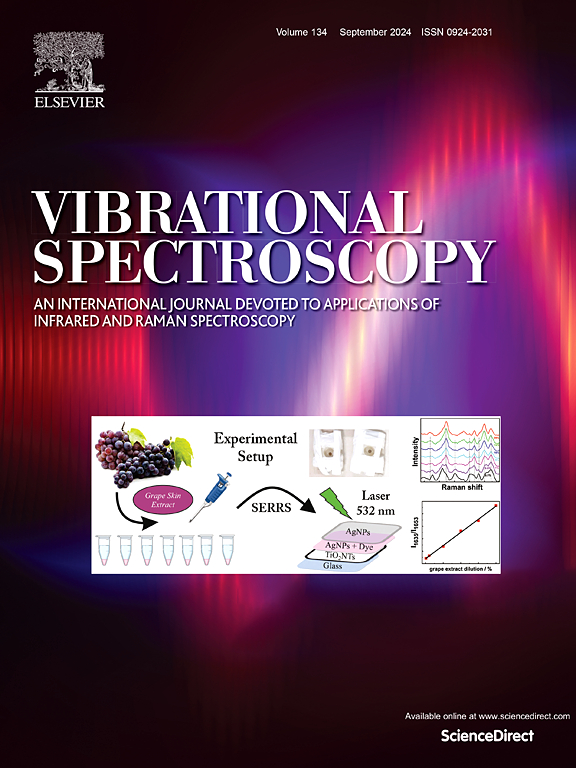Merging Partial Least Squares & Raman spectroscopy to quantify oxidative stability in biodiesel
IF 3.1
3区 化学
Q2 CHEMISTRY, ANALYTICAL
引用次数: 0
Abstract
As biodiesel is becoming more important as an alternative and cleaner biofuel in the energy transition, methodologies for monitoring its quality are necessary to guarantee the integrity of engines. One of the most relevant parameters in the quality control routine is oxidative stability, a characteristic related to the effect of oxygen in biodiesel at room temperature during storage. Quantifying the degree of oxidation in biodiesel is essential as undesirable products, such as sediments, polymers, or short-chain fatty acids, can be formed, significantly modifying its biofuel properties. In this work, for the first time, a rapid and non-destructive methodology based on Raman spectroscopy assisted by Partial Least Squares (PLS) regression was developed to quantify the oxidative stability of soy biodiesel by calibrating its Raman spectra against the induction time, monitored through the reference method. This combined strategy allows a fast and environmentally friendly methodology to quantify the induction time. With it, Root Mean Squared Error values for calibration and prediction of 0.2759 and 0.3260 h, respectively, were reached. These values were significantly lower than those reported by other spectroscopic methodologies, showing that merging the biodiesel's highly informative Raman features with the potentiality of chemometric modeling is very promising for rapid routine analyses that can be easily adapted outside the laboratory. Besides, this provides a substantial advancement in biodiesel quality control, considering that its use as a biofuel continuously grows worldwide.
合并偏最小二乘和拉曼光谱量化生物柴油的氧化稳定性
随着生物柴油在能源转型中作为一种更清洁的替代生物燃料变得越来越重要,监测其质量的方法对于保证发动机的完整性是必要的。氧化稳定性是生物柴油质量控制过程中最重要的参数之一,这一特性与氧气在室温下储存过程中的影响有关。量化生物柴油中的氧化程度是必要的,因为不希望的产物,如沉积物、聚合物或短链脂肪酸,可以形成,显著改变其生物燃料特性。在这项工作中,首次建立了一种基于拉曼光谱辅助偏最小二乘(PLS)回归的快速非破坏性方法,通过参考方法监测诱导时间校准其拉曼光谱来量化大豆生物柴油的氧化稳定性。这种组合策略允许一种快速和环保的方法来量化诱导时间。使用该方法,得到校准和预测的均方根误差值分别为0.2759和0.3260 h。这些值明显低于其他光谱方法报告的值,表明将生物柴油的高信息量拉曼特征与化学计量模型的潜力相结合,对于快速常规分析非常有希望,可以很容易地在实验室外进行调整。此外,考虑到生物柴油作为生物燃料的使用在世界范围内不断增长,这为生物柴油的质量控制提供了实质性的进步。
本文章由计算机程序翻译,如有差异,请以英文原文为准。
求助全文
约1分钟内获得全文
求助全文
来源期刊

Vibrational Spectroscopy
化学-分析化学
CiteScore
4.70
自引率
4.00%
发文量
103
审稿时长
52 days
期刊介绍:
Vibrational Spectroscopy provides a vehicle for the publication of original research that focuses on vibrational spectroscopy. This covers infrared, near-infrared and Raman spectroscopies and publishes papers dealing with developments in applications, theory, techniques and instrumentation.
The topics covered by the journal include:
Sampling techniques,
Vibrational spectroscopy coupled with separation techniques,
Instrumentation (Fourier transform, conventional and laser based),
Data manipulation,
Spectra-structure correlation and group frequencies.
The application areas covered include:
Analytical chemistry,
Bio-organic and bio-inorganic chemistry,
Organic chemistry,
Inorganic chemistry,
Catalysis,
Environmental science,
Industrial chemistry,
Materials science,
Physical chemistry,
Polymer science,
Process control,
Specialized problem solving.
 求助内容:
求助内容: 应助结果提醒方式:
应助结果提醒方式:


